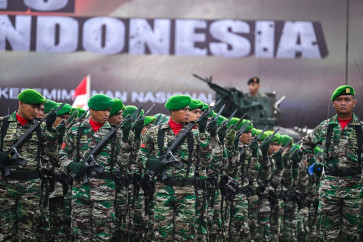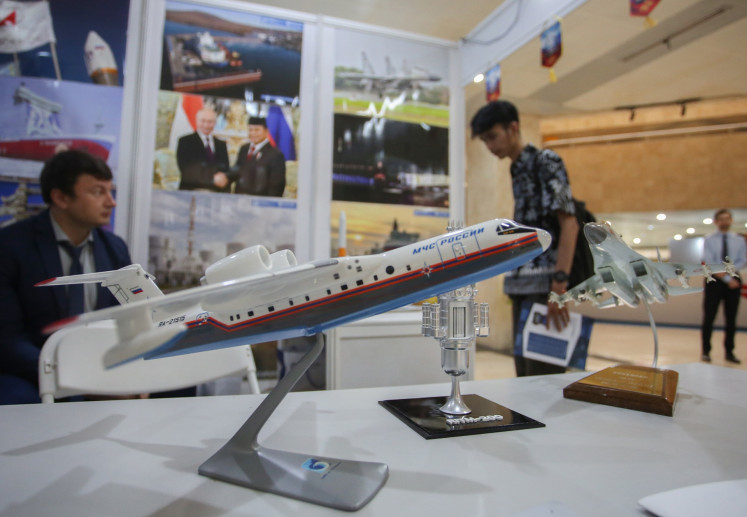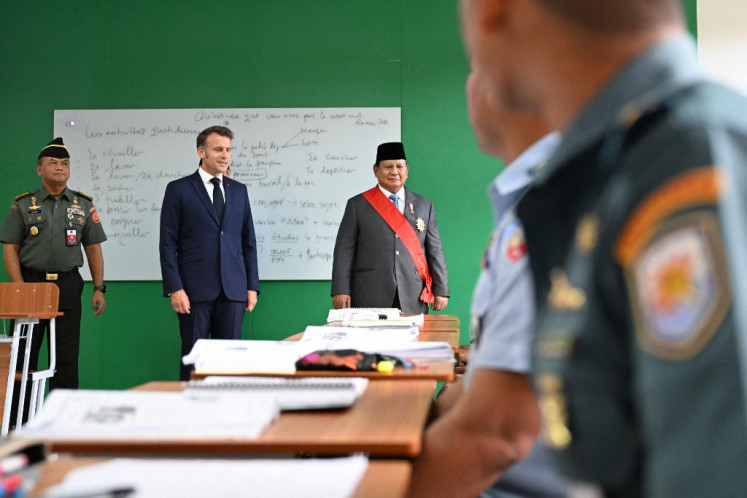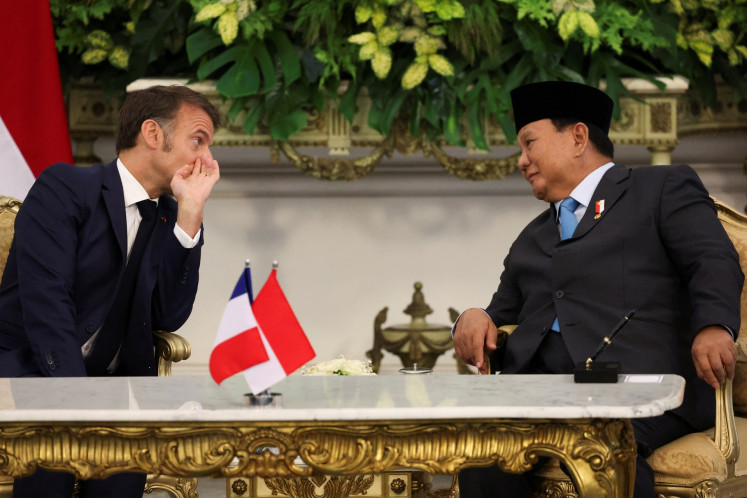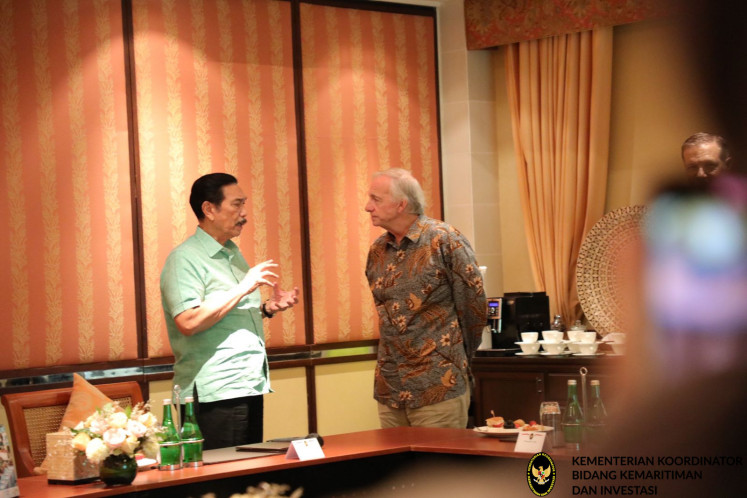US freedom of navigation claims groundless
Furthermore, in accordance with Article 53 ( 12 ), even though Indonesia has not designated an East-West route, the right of archipelagic sea lanes passage may still be exercised through the routes normally used for international navigation.
Change text size
Gift Premium Articles
to Anyone
 The Air Force Thunderbirds fly in formation during graduation ceremonies at the 2016 class of the US Air Force Academy, in Colorado Springs, Colo. (AP/Pablo Martinez Monsivais)
The Air Force Thunderbirds fly in formation during graduation ceremonies at the 2016 class of the US Air Force Academy, in Colorado Springs, Colo. (AP/Pablo Martinez Monsivais)
T
he US Department of Defense ( DoD ) publishes its Freedom of Navigationreport from time to time. In the report, the DoD has stated that numerous countries with excessive maritime claims are allegedly exercising rights against the use of the sea guaranteed to all nations by international law.
Since 2000, the US has included Indonesia in its report. Only one alleged excessive maritime claim by Indonesia is usually stated in the report, nonetheless since 2010, more than one claim have been filed against Indonesia. In fact, in 2014 there were three maritime claims listed.
The US is a signatory to the UN Convention on Law of the Sea ( UNCLOS ) but has not ratified the convention. On other hand, Indonesia has been cooperative in implementing UNCLOS since its inception in 1982. Furthermore, Indonesia has signed and ratified the instrument.
Now the question is whether the US unilateral act through publication of reports containing excessive maritime claims should be considered a concern by other states?
In my view, states should not consider this issue something urgent and rather table it through the bilateral track. Speaking of Indonesia, in the 2014 DoD report, Indonesia is alleged to have exercised excessive maritime claims in three aspects: partial designation of archipelagic sea lanes, prior notification required for foreign warships to enter the territorial sea and the archipelagic waters and restriction on stopping, dropping anchor, or cruising without legitimate reasons in seas adjoining the territorial sea.
Article 53 ( 1 ) UNCLOS regulates designation of archipelagic sea lane passage by archipelagic states. Indonesia, in accordance with Article 53 ( 9 ) has proposed the establishment of the Archipelagic Sea Lane Passage of Indonesia ( ALKI ) to the International Maritime Organization ( IMO ).
As a result, Indonesia has set ALKI as mandated by Article 53 ( 1 ) UNCLOS and regulated it into national law through Government Decree No. 37/2002.
Determination of ALKI is based on the 69th Maritime Safety Committee ( MSC ) held in London on May 11-20, 1998. Nonetheless, in its decision, the MSC awarded partial designation of ALKI.
One of its considerations was that ALKI had not included an East-West route. This is why the US has alleged Indonesia of exercising excessive maritime claims.
To accommodate various views of foreign states that have not fully accepted the designation awarded by the IMO, Indonesia has reached an agreement with the US and Australia in providing the right of innocent passage over archipelagic waters, known as “19 Rules Agreed by the US, Australia and Indonesia on the exercise on archipelagic sea lanes passage”.
Furthermore, in accordance with Article 53 ( 12 ), even though Indonesia has not designated an East-West route, the right of archipelagic sea lanes passage may still be exercised through the routes normally used for international navigation.
Government Decree No. 8/1962 required prior notification for warships entering the territorial sea and archipelagic waters of Indonesia.
The decree was then replaced by Government Decree No. 37/2002 on the rights and obligations of foreign ships and aircraft in implementing the rights of archipelagic Sea lane passage through designated archipelagic sea lanes, which scraps the provision on prior notification.
Notifications are only required for foreign warships intending to stop at Indonesian ports.
Pursuant to the third maritime excessive claim, Indonesia has never set any restriction as such in seas adjoining its territorial waters. The marine area adjoining the territorial sea is the contiguous zone, which is also part of Economic Exclusive Zone ( EEZ ).
As stipulated in Article 33 of UNCLOS, in the contiguous zone, states are authorized to conduct necessary coastal surveillance in order to prevent violations of laws and regulations, customs, fiscal and immigration.
There is no provision in the contiguous zone regime that specifically prohibits foreign ships to stop, anchor and cruise without any reason in the contiguous zone.
In the EEZ, as stipulated in section 5 UNCLOS ( articles 55-75 ), a coastal state has sovereign rights for the purpose of exploring and exploiting, conserving and managing the natural resources, whether living or non-living, of the waters superjacent to the seabed and of the seabed and its subsoil, and with regard to other activities for the economic exploitation and exploration of the zone.
Article 73 of UNCLOS, which regulates law enforcement in the EEZ, says coastal states may take such measures, including boarding, inspection, arrest and judicial proceedings, as may be necessary to ensure compliance with the laws and regulations that was determined in accordance with the provisions of UNCLOS.
In the EEZ regime, there is no specific arrangement that prohibits foreign ships to stop, anchor or cruise without legitimate reason.
Nonetheless, coastal states may take action as stipulated in Article 73 UNCLOS in such circumstances where foreign vessels violate the national laws governing its sovereign rights in the EEZ.
In conclusion, the three claims directed against Indonesia by the US should not be included in its report as they do not represent the prevailing Indonesian legal provisions governing maritime area.
This unilateral act should not continue.
The allegations should instead be discussed with the states mentioned on the list. Bilateral forums are more appropriate and effective in addressing and resolving allegations of excessive maritime claims of states.
***
The author is writing a PhD thesis on maritime security challenges in Southeast Asia at the Australian National Center for Ocean Resources and Security, University of Wollongong, Australia.
---------------
We are looking for information, opinions, and in-depth analysis from experts or scholars in a variety of fields. We choose articles based on facts or opinions about general news, as well as quality analysis and commentary about Indonesia or international events. Send your piece to community@jakpost.com.


